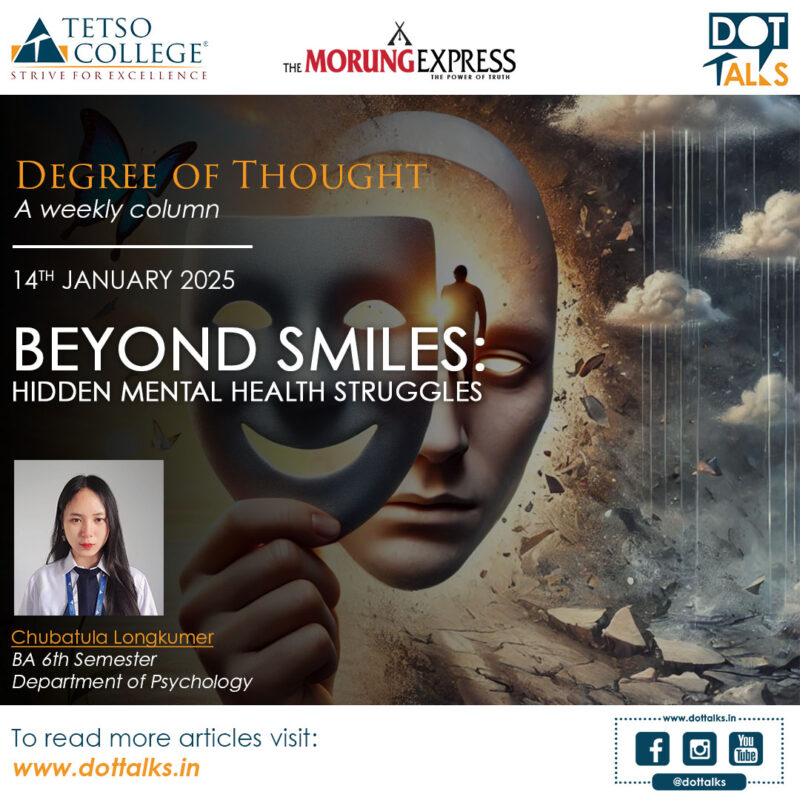
Beyond Smiles: Hidden Mental Health Struggles – Chubatula Longkumer, BA 6th Semester, Department of Psychology
In the depth of our minds, a battle rages on, a battle to confront the darkness, to silence the critics, and to find solace in the chaos. Mental health awareness is not just a topic of discussion; it’s a beacon of hope, a lifeline for those drowning in the ocean of their own minds. As we go about our daily lives, it’s easy to overlook the importance of our mental well-being. Mental health affects us all, directly or indirectly, and yet it remains a taboo topic in many of our communities.
The statistics are staggering, The World Health Organization (WHO) estimates that mental health issues will be the leading cause of disability by 2030. Globally, 1 in 4 people experience a mental health issue each year.
In 2019, 970 million people were living with mental disorders, with Anxiety and Depression being the most common. In 2022, 66.7% of adults with serious mental illness received mental health treatment, with more females than males receiving treatment. Suicide is the third leading cause of death for people aged 15-29 suffering from mental disorders. In 2017, 14.6% of Indians were affected by mental disorders, which was double the disease burden from 1990 to 2017. In 2022, India’s suicide rate was 11.6 per 100,000.
As per the report of Department of Health and Family Welfare, around 20,000 people in Nagaland are suffering from severe mental illness and 200,000 are suffering from minor mental illnesses. In addition to the existing health problems, many aspects of mental health have been challenged due to the emergence of the COVID-19 pandemic.
In our society, a society quite contemporary and orthodox, our perspective on mental health is deeply rooted in our spiritual traditions, cultures and values. We tend to accept what is normal, but find it arduous to accept what is peculiar. Cultural beliefs and traditional practices related to mental illness vary across different regions and communities. These beliefs can influence help-seeking behaviors, treatment approaches, and perceptions of mental health. Sometimes, cultural beliefs may stigmatize mental illness, discourage open discussions, and promote harmful practices or ineffective remedies. This can hinder access to medical care and perpetuate the cycle of mental health-related challenges. The availability of mental health professionals is insufficient to meet the growing demand for mental healthcare in our society. The shortage is particularly prominent in rural areas, where access to mental health professionals is limited.
Limited awareness and pervasive stigma surrounding mental health issues in our society contribute to the underutilization of mental healthcare services. In the context of the Covid-19 pandemic, the mental health burden on our society has been significant, with post-trauma, anxiety and increased levels of stress.
Despite its prevalence, mental illness remains shrouded in shame and secrecy. It often goes undiagnosed and untreated. This illness carries a significant social stigma in our society, leading to discrimination and social exclusion for individuals with mental health problems which often stems from misconceptions, fear, and a lack of awareness. This stigma creates barriers to seek help and support, as individuals may fear judgment, rejection, or negative consequences. Consequently, individuals may delay or avoid seeking treatment, resulting in inadequate or delayed care and further exacerbating their condition.
Mental health awareness is not just about numbers; it’s about the human experiences, it’s about the faces behind the statistics. It’s about the mother who struggles to get out of bed, the father who hides his tears behind a mask of strength, and the child who feels lost and alone in a world that seems too big to handle. It’s about the struggles we face, the triumphs we achieve, and the resilience we develop. It’s about the complexities of the human mind, the intricacies of our emotions, and the depth of our thoughts.
The silence surrounding mental health is deafening. We whisper about it in hushed tones, afraid to confront the reality of our own minds. We’re afraid to seek help, afraid of being judged, afraid of being labeled as “crazy.” But the silence is killing us. It’s killing our loved ones, our friends, and our colleagues. The silence is perpetuated by stigma, shame, and fear. We’re afraid to admit our vulnerabilities, afraid to show our weaknesses, and afraid to ask for help. We’re afraid of being seen as fragile, afraid of being perceived as weak, and afraid of being treated differently.
But the silence can be broken. We can start by educating ourselves. We can learn about mental health conditions, their symptoms, and treatment options. We can learn how to support our loved ones, how to listen without judgment, and how to encourage them to seek help.
We can create a culture of openness and honesty. We can share our own struggles, our own fears, and our own triumphs. We can create a safe space for others to do the same. We can foster a community that values vulnerability, empathy, and compassion.
We can demand better from our mental health system. We can advocate for increased funding, improved access to services, and more effective treatments. We can push for policy changes, increased resources, and better support for mental health professionals.
And most importantly, we can prioritize our own mental health. We can take care of ourselves, practice self-compassion, and seek help when we need it. We can recognize the signs of mental health issues, and we can take action to prevent them.
The time for silence is over. It’s time to prioritize mental health, and create a world where seeking help is a sign of strength. Mental illness is not a weakness but an illness that needs care and treatment, just like any physical condition. Together, we can shatter the silence, spark meaningful conversations, and ensure mental health awareness becomes a global priority. Let’s unite to make a lasting difference.
Degree of Thought is a weekly community column initiated by Tetso College in partnership with The Morung Express. Degree of Thought will delve into the social, cultural, political and educational issues around us. The views expressed here do not reflect the opinion of the institution. Tetso College is a NAAC Accredited UGC recognised Commerce and Arts College. The editorial team includes Chubamenla, Asst. Professor, Dept. of English and Rinsit Sareo, Asst. Manager, IT, Media & Communications.
For feedback or comments please email: dot@tetsocollege.org

